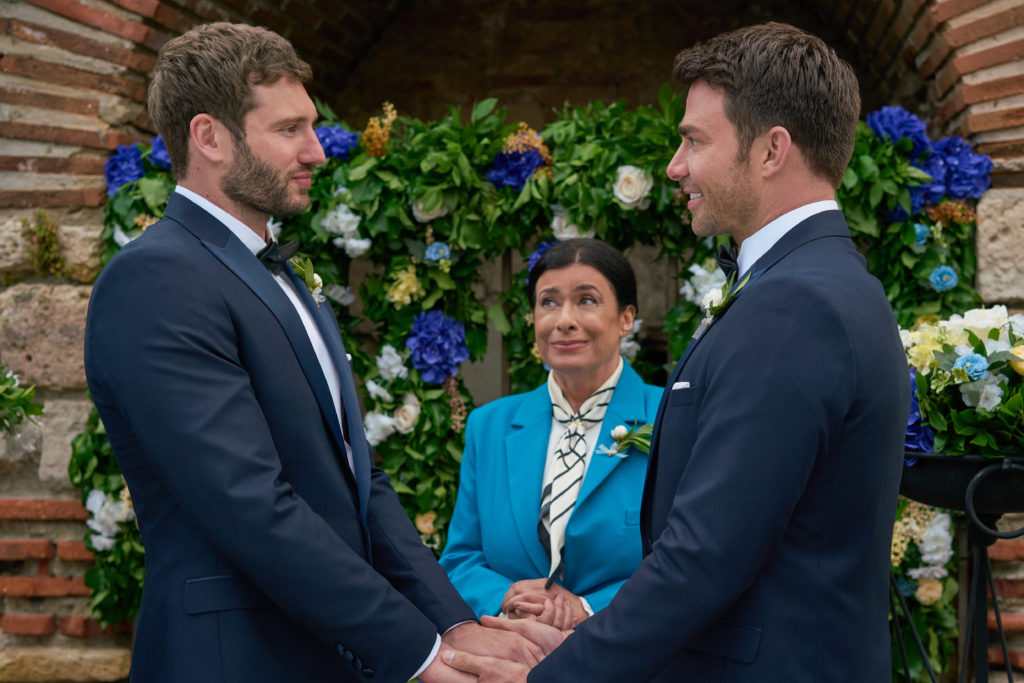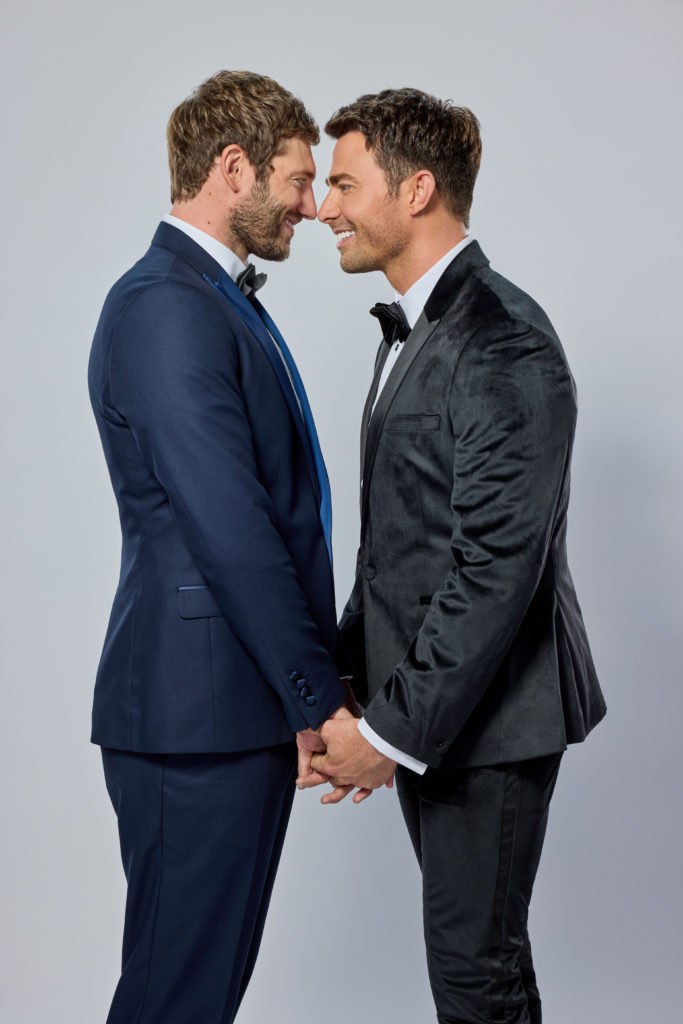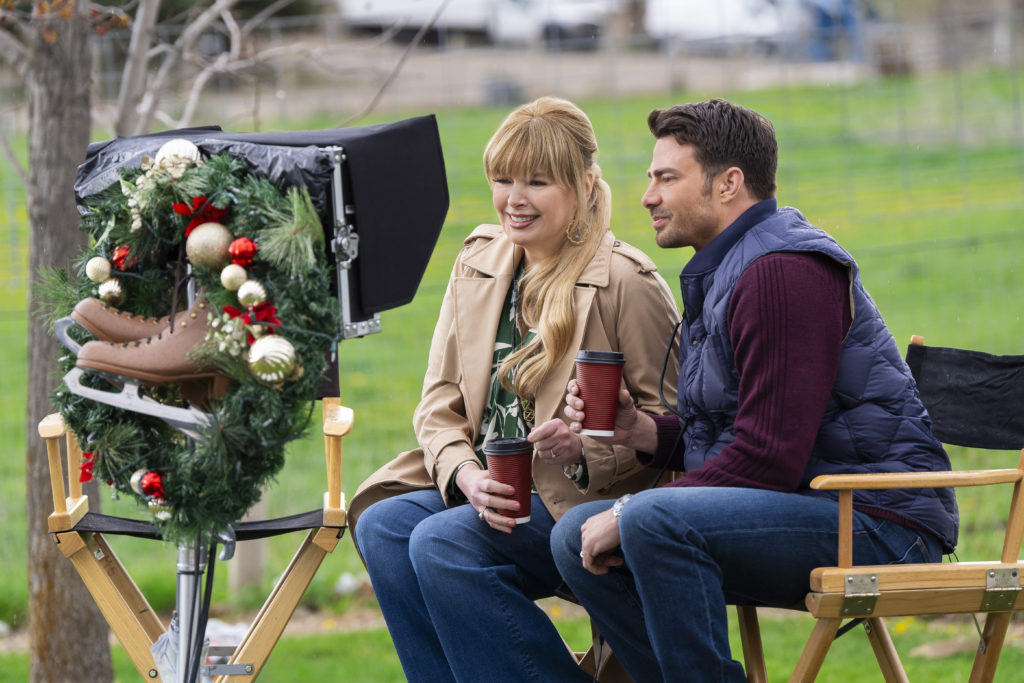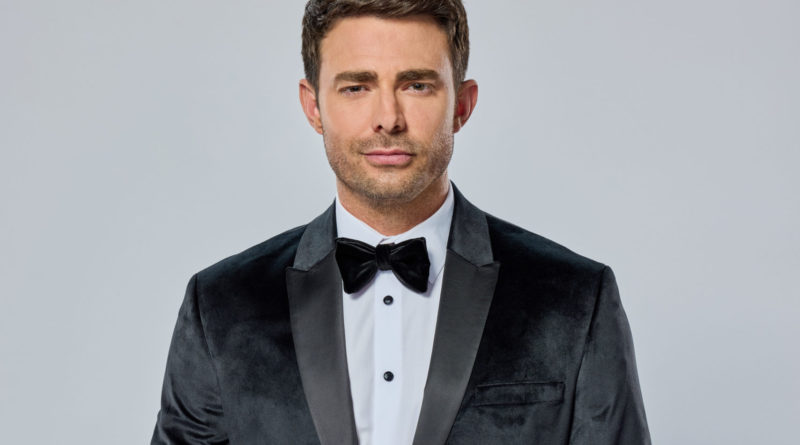The Gay King of Christmas
From ‘Mean Girls’ to Hallmark’s champion of queers, Jonathan Bennett’s story is a testament to the power of being unapologetically yourself
By Chris Azzopardi
Fortunately, queer representation on the Hallmark Channel is no longer a rare Christmas miracle, and much of that progress can be attributed to Jonathan Bennett. The actor, producer and proud Midwesterner is breaking barriers and challenging norms as a trailblazing advocate for queer love stories on a national stage.

From his early days in Toledo, Ohio, where he embraced life as a self-described “little queen,” to earning the fan-dubbed title “The Gay King of Christmas,” the “Mean Girls” actor has built a career rooted in authenticity, resilience and a passion for storytelling — especially narratives that celebrate inclusivity and resonate with diverse audiences. Now 43, he takes pride in seeing others thrive in the spaces he has worked tirelessly to create. He has not one but two groundbreaking queer-inclusive projects on the Hallmark Channel: “Finding Mr. Christmas,” a reality competition series he hosts in search of the next leading man for a Hallmark Christmas movie, and “The Groomsmen,” a three-part film that follows three best friends from diverse backgrounds and cultures as they come together to celebrate their weddings.
In a recent video interview, Bennett reflected on his roots, fondly recalling late-night drives from Ohio to Ann Arbor to go clubbing at Necto. (“Necto for life, baby!” he exclaimed.) He also shared his aspirations for LGBTQ+ representation in media, including a dream project: reuniting with Lindsay Lohan for a holiday film. (Lindsay, are you listening?)
Ever the showman, Bennett introduced himself on camera with a playful face-framing gesture but confessed he couldn’t fully commit to the move. “My suit’s so friggin’ tight I can’t even lift my arms,” he joked. While it wasn’t exactly the moment for an armpit reveal, Bennett cheekily added, “Watch ‘Mr. Christmas.’ There are plenty of shirtless guys there.”
 What can you tell me about growing up in Toledo and spending some time in Ann Arbor?
What can you tell me about growing up in Toledo and spending some time in Ann Arbor?
I was just a little queen dancing around in Toledo, but we only had one gay bar called Bretz and me and my friends would drive up to Michigan and go to the Nectarine. Is it called Necto now or do they still call it Nectarine?
It’s just Necto.
Now it’s Necto, very millennial. They shortened it and made it cooler.
For Gen Z’ers, it’ll just be Nec.
N. It’ll just be the letter N.
What do the people back home in Ohio say about you being “The Gay King of Christmas”?
My family loves it. It’s been a journey going from a little gay boy in Ohio scared of his own shadow, because it’s just a different place to grow up. You have to code-switch. You have to do all these things to protect yourself growing up and then to really own who you are and be unapologetically yourself. And then to do that on national television and then to tell queer stories with love stories that look like your love story for the world to see has been such a journey. It really has.
And it’s scary at times, but also so rewarding for so many, many reasons. I tell these stories and make sure that we’re telling queer love stories on Hallmark because I think Hallmark has the power to reach such a vast audience.
After doing my first Hallmark movie, “The Christmas House,” where I had the first same-sex kiss, I saw the outpouring of support and love and the need for that story to be told. I knew that my purpose in life and my mission was to tell queer stories to a broad audience and not tell queer stories to a queer audience because those stories are being told a lot.
But what I wanted to focus on was telling queer stories to a broad audience that might not know an LGBTQ+ person in their life or might not know that they know one and be able to really show the humanity of those characters — and what their love looks like — so that way people watching could then identify with them as people and maybe connect with them as people. Maybe you can also change some hearts and minds that way.
With these films, how did you start to see that you were having that kind of influence?
After I did “The Christmas House,” so many people reached out online and messaged me just saying, “Thank you. I got to watch a Christmas movie with my family like we always do at the holidays, but this time I was able to see a love that looked like mine on screen.” And it’s a super powerful thing for people to feel represented in storytelling.
And it was the outpour of support and the outpouring of a lot of moms messaging me saying, “Hey, my teenager just came out to me and we were looking for what we could watch and watching your movies and seeing your love, he just lit up because he felt so connected to the characters and he felt seen.” So it wasn’t just the queer people reaching out to me. It was a lot of the parents reaching out saying, “Hey, just want to tell you ‘thank you.’” And that was the moment where I was like, oh, this is my mission now. This is what I do. This is all I do.
You keep breaking new ground regarding LGBTQ+ inclusion onscreen on Hallmark. Do you intend to keep moving in that direction?
I love a challenge and I love doing things that haven’t been done. That’s what ignites me. Tell me no, because that will fire me up more than anything. Tell me we can’t do it, because I will find a way for it to happen.
Being a queer actor in Hollywood for 20 years, I got so many nos and doors closed that it just fuels your fire where you’re like, I now have a tank, a battering ram, a cannon, and I will bust down any door that you try to close and I will open it no matter what. And it’s not about me opening the door, it’s about who walks in the door after I open it. That’s my goal: opening the doors of new characters and new storytelling on Hallmark and just in the Christmas space and in the romantic-comedy space in general. I love breaking down doors, but I also do it because I’m excited to see who walks through it after me. It’s not about me, it’s about the stories. I’m happy to open the door to let others walk through.
After seeing one of the contestants, Daxton Bloomquist, on “Finding Mr. Christmas” and hearing his story as a fellow gay Midwesterner, you got emotional. What was going through your mind?
I think that moment with Daxton in the first episode is a culmination of all my hard work for the past four years of telling queer stories. And I remember him saying to me, “The reason I’m able to be here covered in glitter with a big rainbow sweater and a boa and feel confident prancing down the runway of the sweater challenge is because I feel safe because you’re here. Because I know you did it.” And when he said that to me, I got so emotional because it was like that moment where you’re like, it worked. It friggin’, friggin’, friggin’ worked.
There’s that old poem about the person going with all the starfish that washed up on the sea, and they’re throwing the starfish back and they look down and the guy says, “But there’s thousands of them. This isn’t going to make a difference.” And the guy picks up a starfish and throws it back in the sea and he goes, “It made a difference to that one.” And so it’s like, I’m not going to be able to save everyone and I’m not going to be able to do everything for everyone, but just Daxton telling me that was enough. I did it. I open the door and guess what? Daxton was the next person to walk through it. What a friggin’ delight.

What challenges have you faced in changing the narrative for queer people on TV?
It has been challenging and it hasn’t, because the network has been super supportive of every single queer idea or storyline I bring to them. They pretty much greenlight everything I bring that makes sense and works. The challenge for me as a creator, producer, writer and actor is bringing to Hallmark storylines and scripts that are rooted in humanity with a love story that is authentic and beautiful. That’s where the challenge is — making sure that we’re telling a story that everyone can relate to. I think the big challenge for me in telling queer stories is… I have written on my dry erase board at home “BBD: Bigger, Better, Different.” What are we doing that is BBD with storytelling? Is it bigger than another story we’ve told? Is it better than another story or is it different? It’s got to have at least two of those three qualities.
So the pressure to tell queer stories is immense for me because I want to make sure that every time I do it, I do it in the most authentic, correct way possible. And I’m very proud of the projects that I’ve done and been a part of and told queer stories in because I do feel like every single one of them is authentic. They’re authentic and they’re grounded. We’re not just telling a gay story to tell a gay story.
What inspired the portrayal of a gay man within a circle of straight male friendships in “The Groomsmen”? Could you share what influenced this dynamic and what thoughts guided you in shaping this group dynamic?
I got married two years ago. My group of friends were my groomsmen in my wedding; some were gay, some were straight, and I was the groomsman in most of their weddings the years before that. Some of us were gay, some were straight. And I thought that was a really interesting plot for a storyline because it’s something that really happens in 2024. And it’s something we don’t see in movies a lot. We don’t see straight friends and gay friends in one kind of squad brotherhood, navigating life. But that’s the funniest group of friends to navigate life with. And it’s the most interesting group of friends to navigate life with.
Because in my group of friends, we make fun of each other constantly every single day. If you’re being nice to me, I know something’s up; if you’re making fun of me or calling me out or cracking a joke at my expense, that’s how a lot of men show love for each other. That’s how we share our emotions with each other.
But then that same group of friends, at the end of the day, if you’re crying and need someone, a shoulder to cry on, they’re the first ones there. So I think there’s a really fun dynamic of taking the piss out of each other. I can’t lie to my squad. If I try, they call me out instantly and they’re like, “Bullshit, Jonathan.”
And then, if at the end of the day, those same guys that are making fun of me for not being authentic and real, I can then call and say, “I need help,” and they’re the first ones to show up. So I think it’s a really powerful dynamic to show in movies, and we’ve never seen it before. So that, again, goes back to my storytelling kind of agony that I have when trying to tell these stories. Is it bigger, better and different than the other stories we’ve seen? “The Groomsmen” definitely was, and that’s why it was a no-brainer.
People on the internet are really into the chemistry between you and your co-star, Alexander Lincoln. What should people know about building that relationship for the screen?
You know what? Alexander is such a goof and an idiot, and I mean that in the best way possible. He’s just unapologetically Alexander. And that’s what’s so fascinating about him. And it goes back to the thing that I really try to strive for, which is being unapologetically yourself. And he is that.
And so it was so easy to have chemistry with him because we both were like, here’s who I am. Here’s my quirks. Here’s what I do. It was almost like when I met my husband, Jaymes. I was just myself and just so stupid and corny and cheesy and wacky, and that’s what made Jaymes fall in love. And so meeting Alex, we both were just authentically us.
It was just so fun to have him on set because he also is different from any of the other Hallmark actors that you’re used to seeing. He has a different style in his acting, which I thought was really refreshing.
I have to ask about you and Lindsay — Lindsay Lohan, of course.
Oh yes. There’s only one Lindsay in my life.
You are now both a part of the Christmas universe. Does that mean you two will bring your universes together at some point?
So let me tell you what I want: I want to do a Christmas movie with Lindsay, and I want her to be my guardian angel. I want it to be a “Christmas Carol” where she’s like the Christmas angel or ghost that comes and helps lead me through whatever I need to learn on my journey around the holidays, because I think that would be so funny, and I think Lindsay would look so fierce in a really amazing, sexy, white outfit, and she’s just like my angel that comes and leads me around, and I think that would be a really fun movie to make.
And you’ve told her this?
I have not, but we’re telling her right now.
What did you think of the new “Mean Girls” adaptation?
I haven’t seen it because I was busy being on Broadway. I didn’t get to see the movie because I was in a show eight times a week, so haven’t seen it, but maybe I’ll watch it one day.
Did you contribute to any of the decor in the “Finding Mr. Christmas” house? And did you take any of the decor with you when you left it?
I helped design the entire aesthetic of the show and the house. I was one of the designers of it. However, I didn’t actually physically do anything because we had the most amazing art department and set designer that did all that stuff. And so I helped come up with it, but I didn’t actually execute any of it.
I didn’t steal anything from the set, but I did walk out with 10 new friends, which are the hunks of “Finding Mr. Christmas,” because they’re such a brotherhood. They’re such a squad. They’re just such a great group of guys and they’re there for each other. And so I walked out with 10 new friends.
Did you ever steal anything from the “Mean Girl” set?
No, but I stole my jacket from “Christmas House” because… well, I wouldn’t say I stole it, but I took it and then they never asked for it back because it was fitted to me like a glove. It fits so well that I’m like, OK, I’m taking this home. I need this jacket in my life.
And then they called a few months later and were like, “We need the jacket back because it’s going in the Smithsonian archives under the LGBTQ+ archives for the first time there was ever a same-sex kiss in a Christmas movie. And I was like, OK, it’s a good weekend to give the jacket back. And so I have to go pretend like, oh, I must have taken it accidentally and send it back to the network so they could put it in the archives. The one time I take a jacket that’s fitted to me like a glove is the time that the Smithsonian calls and is like, “We need the jacket back.”
Chris Azzopardi is the Editorial Director of Pride Source Media Group and Q Syndicate, the national LGBTQ+ wire service. He has interviewed a multitude of superstars, including Cher, Meryl Streep, Mariah Carey and Beyoncé. His work has also appeared in The New York Times, Vanity Fair, GQ and Billboard. Reach him via Twitter @chrisazzopardi.

